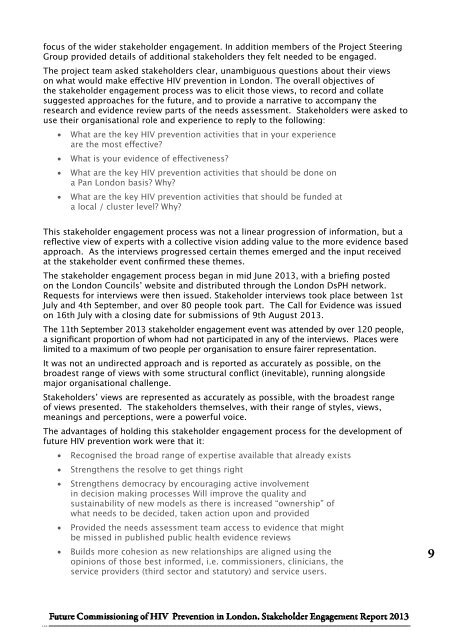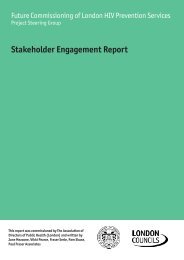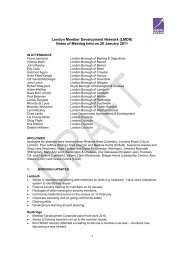Stakeholder Engagement Report - London Councils
Stakeholder Engagement Report - London Councils
Stakeholder Engagement Report - London Councils
Create successful ePaper yourself
Turn your PDF publications into a flip-book with our unique Google optimized e-Paper software.
focus of the wider stakeholder engagement. In addition members of the Project Steering<br />
Group provided details of additional stakeholders they felt needed to be engaged.<br />
The project team asked stakeholders clear, unambiguous questions about their views<br />
on what would make effective HIV prevention in <strong>London</strong>. The overall objectives of<br />
the stakeholder engagement process was to elicit those views, to record and collate<br />
suggested approaches for the future, and to provide a narrative to accompany the<br />
research and evidence review parts of the needs assessment. <strong>Stakeholder</strong>s were asked to<br />
use their organisational role and experience to reply to the following:<br />
• What are the key HIV prevention activities that in your experience<br />
are the most effective?<br />
• What is your evidence of effectiveness?<br />
• What are the key HIV prevention activities that should be done on<br />
a Pan <strong>London</strong> basis? Why?<br />
• What are the key HIV prevention activities that should be funded at<br />
a local / cluster level? Why?<br />
This stakeholder engagement process was not a linear progression of information, but a<br />
reflective view of experts with a collective vision adding value to the more evidence based<br />
approach. As the interviews progressed certain themes emerged and the input received<br />
at the stakeholder event confirmed these themes.<br />
The stakeholder engagement process began in mid June 2013, with a briefing posted<br />
on the <strong>London</strong> <strong>Councils</strong>’ website and distributed through the <strong>London</strong> DsPH network.<br />
Requests for interviews were then issued. <strong>Stakeholder</strong> interviews took place between 1st<br />
July and 4th September, and over 80 people took part. The Call for Evidence was issued<br />
on 16th July with a closing date for submissions of 9th August 2013.<br />
The 11th September 2013 stakeholder engagement event was attended by over 120 people,<br />
a significant proportion of whom had not participated in any of the interviews. Places were<br />
limited to a maximum of two people per organisation to ensure fairer representation.<br />
It was not an undirected approach and is reported as accurately as possible, on the<br />
broadest range of views with some structural conflict (inevitable), running alongside<br />
major organisational challenge.<br />
<strong>Stakeholder</strong>s’ views are represented as accurately as possible, with the broadest range<br />
of views presented. The stakeholders themselves, with their range of styles, views,<br />
meanings and perceptions, were a powerful voice.<br />
The advantages of holding this stakeholder engagement process for the development of<br />
future HIV prevention work were that it:<br />
• Recognised the broad range of expertise available that already exists<br />
• Strengthens the resolve to get things right<br />
• Strengthens democracy by encouraging active involvement<br />
in decision making processes Will improve the quality and<br />
sustainability of new models as there is increased “ownership” of<br />
what needs to be decided, taken action upon and provided<br />
• Provided the needs assessment team access to evidence that might<br />
be missed in published public health evidence reviews<br />
• Builds more cohesion as new relationships are aligned using the<br />
opinions of those best informed, i.e. commissioners, clinicians, the<br />
service providers (third sector and statutory) and service users.<br />
9




